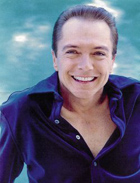
David Cassidy in the News
Cassidy survival kit
July 30, 1973
By Michael Wale
The Times
It takes a journey to his home in a valley outside Los Angeles away from the weenybopping screams, to be able to find out about, David Cassidy.
So often the public face in popular entertainment conflicts with the private person. And within these past 12 months it is the private persona of David Cassidy, never seen by the public, that has changed.
A year ago I visited him on the set of The Partridge Family, the TV series which discovered and then imprisoned him as a perpetual teenager for the past three years. He was extremely tired and strained, welcoming the chance to break away for a talk.
The hours he worked were extraordinary. From 7 in the morning, when he entered to make up (although playing a teenager he is in fact nearly 24), through till 5 or so he was on the set. Then he went into the recording studios to work on albums for The Partridge Family or himself, he was seldom home before 10. Any lull from the series was spent touring.
Early this summer, after his European tour, he returned to a strike by screenwriters. So for 15 weeks he had nothing to do for the first time in his life except sit at home and relax. It was a fate he was only too keen to enjoy, as he still has 24 more episodes of The Partridge Family to film before he leaves the series for good.
It is too easily forgotten that today's pop star came from a show business family and started life as an actor. He is the son of Jack Cassidy and Evelyn Ward, who appeared in the Broadway production of South Pacific among other shows. "Contrary to public opinion, I was brought up in a really American middleclass way. My parents were not stars, they were just working until my father got divorced and married Shirley Jones (who is in The Partridge Family) and took off ". When his mother moved from New York to Los Angeles the youthful Cassidy went with her. Evelyn Ward appeared in the Los Angeles production of And So to Bed, and they wanted a young boy who could sing and dance, which is how he made his stage debut. When he left school he returned to New York and got a job so that he could go round the theatrical agents during his lunch hour, which culminated in his getting a part in a Broadway show that folded after a matter of days. Depressed by this sudden failure he returned to the West Coast, and spent his time doing bit parts on television before he came to audition for the then newly created Partridge Family.
He was hired, therefore, as an actor, but as soon as he was seen on screen he was snatched by the American fan magazine market, always at the ready to replace a current fave rave. Cassidy was chosen by these magazines as the successor to Bobby Sherman, purely on his boyish good looks and vulnerability. Screen Gems, who owned The Partridge Family, then seized their chance, and he was launched as a singer in the tradition of other created pop music products such as The Monkees and The Archies. At the time, he says, he was left in no doubt that he too had been created " They told me they could just find one on the street, and they could pick him up and put him in a magazine and he would become a star ".
So he became the human product of a marketing campaign, highly efficient, highly successful, but to the individual concerned a little puzzling: " They had this little kid, a little baby actually, who is 19-years old. And I had never sung on record. I didn't even know where to sing, and they propped me up against the mike and said 'Sing, right in here', I had never been to a recording studio in my life, and I had no idea what was going on, and they played me the songs, and I said 'Fine', because it was my gig and in the beginning I was an actor, and so anything that was going to be in the show was fine by me. I mean I didn't have any say at that time as to what songs we did in the show. It just so happened, it wasn't the songs, and it wasn't this and that, it was me starting to happen, and it was weird, it was a strange situation to be in." "The only unfortunate thing was that I had no more time to make mistakes. I was in the limelight from then on. I just had to produce, and I think I was misguided with a lot of the material that I did ". Looking back on the series he agrees: "They created a vehicle for me to be there. I told them to push it, and that is exactly what they did, they pushed it, so here I am and it's funny, I am still here. I didn't disintegrate. I am not bitter about it because I came out of it better than any other person that I know that has ever been in a similar situation ".
He hopes he'll also stop touring: " Except I'd like to do one big farewell concert for 100,000 people in New York for charity, and maybe return to Britain, but to different cities, especially in Scotland. I only went to London and Manchester before." He has had a lot of film offers, and he hankers to get back to being known as an actor, and yet he still wants to pursue his pop career, although in a much more thoughtful way than before. When we met he had just completed a recording session with his new producer Rick Jarrard, who produced Jefferson Airplane and Nillson's first albums. A very different type of producer from Wes Farrell, the highly skilled hitmaker, who has now moved on poignantly to the next clean. imaged youth successes, the Williams Twins.
Like his father, seen recently on television here on the Julie Andrews Show, Cassidy has a ready sense of humour; and sitting calmly in his well lived in and relaxed single storey house, is able to laugh at himself and what he has gone through. Maybe that theatrical childhood has paid off. As he says, he has certainly survived where many have disappeared. I expect him to be with us for some time to come.
